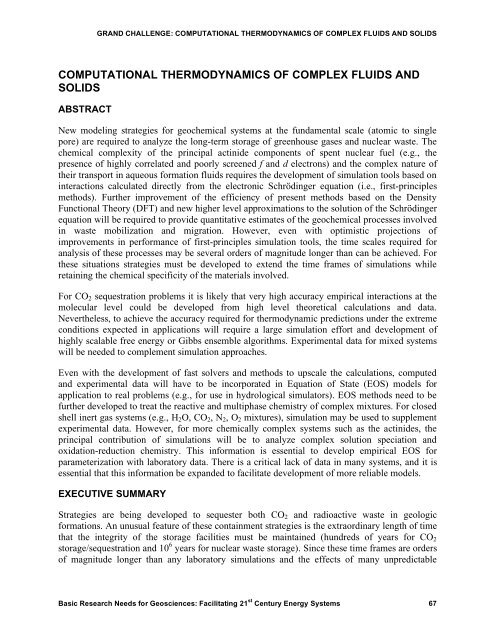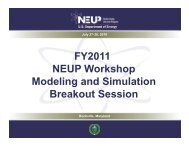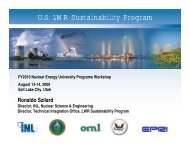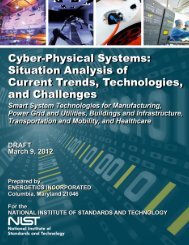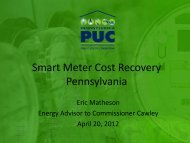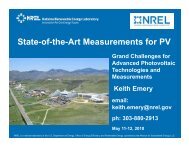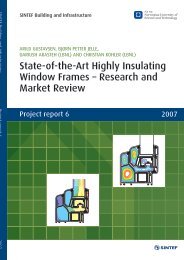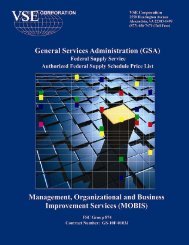Basic Research Needs for Geosciences - Energetics Meetings and ...
Basic Research Needs for Geosciences - Energetics Meetings and ...
Basic Research Needs for Geosciences - Energetics Meetings and ...
- No tags were found...
Create successful ePaper yourself
Turn your PDF publications into a flip-book with our unique Google optimized e-Paper software.
GRAND CHALLENGE: COMPUTATIONAL THERMODYNAMICS OF COMPLEX FLUIDS AND SOLIDSCOMPUTATIONAL THERMODYNAMICS OF COMPLEX FLUIDS ANDSOLIDSABSTRACTNew modeling strategies <strong>for</strong> geochemical systems at the fundamental scale (atomic to singlepore) are required to analyze the long-term storage of greenhouse gases <strong>and</strong> nuclear waste. Thechemical complexity of the principal actinide components of spent nuclear fuel (e.g., thepresence of highly correlated <strong>and</strong> poorly screened f <strong>and</strong> d electrons) <strong>and</strong> the complex nature oftheir transport in aqueous <strong>for</strong>mation fluids requires the development of simulation tools based oninteractions calculated directly from the electronic Schrödinger equation (i.e., first-principlesmethods). Further improvement of the efficiency of present methods based on the DensityFunctional Theory (DFT) <strong>and</strong> new higher level approximations to the solution of the Schrödingerequation will be required to provide quantitative estimates of the geochemical processes involvedin waste mobilization <strong>and</strong> migration. However, even with optimistic projections ofimprovements in per<strong>for</strong>mance of first-principles simulation tools, the time scales required <strong>for</strong>analysis of these processes may be several orders of magnitude longer than can be achieved. Forthese situations strategies must be developed to extend the time frames of simulations whileretaining the chemical specificity of the materials involved.For CO 2 sequestration problems it is likely that very high accuracy empirical interactions at themolecular level could be developed from high level theoretical calculations <strong>and</strong> data.Nevertheless, to achieve the accuracy required <strong>for</strong> thermodynamic predictions under the extremeconditions expected in applications will require a large simulation ef<strong>for</strong>t <strong>and</strong> development ofhighly scalable free energy or Gibbs ensemble algorithms. Experimental data <strong>for</strong> mixed systemswill be needed to complement simulation approaches.Even with the development of fast solvers <strong>and</strong> methods to upscale the calculations, computed<strong>and</strong> experimental data will have to be incorporated in Equation of State (EOS) models <strong>for</strong>application to real problems (e.g., <strong>for</strong> use in hydrological simulators). EOS methods need to befurther developed to treat the reactive <strong>and</strong> multiphase chemistry of complex mixtures. For closedshell inert gas systems (e.g., H 2 O, CO 2 , N 2 , O 2 mixtures), simulation may be used to supplementexperimental data. However, <strong>for</strong> more chemically complex systems such as the actinides, theprincipal contribution of simulations will be to analyze complex solution speciation <strong>and</strong>oxidation-reduction chemistry. This in<strong>for</strong>mation is essential to develop empirical EOS <strong>for</strong>parameterization with laboratory data. There is a critical lack of data in many systems, <strong>and</strong> it isessential that this in<strong>for</strong>mation be exp<strong>and</strong>ed to facilitate development of more reliable models.EXECUTIVE SUMMARYStrategies are being developed to sequester both CO 2 <strong>and</strong> radioactive waste in geologic<strong>for</strong>mations. An unusual feature of these containment strategies is the extraordinary length of timethat the integrity of the storage facilities must be maintained (hundreds of years <strong>for</strong> CO 2storage/sequestration <strong>and</strong> 10 6 years <strong>for</strong> nuclear waste storage). Since these time frames are ordersof magnitude longer than any laboratory simulations <strong>and</strong> the effects of many unpredictable<strong>Basic</strong> <strong>Research</strong> <strong>Needs</strong> <strong>for</strong> <strong>Geosciences</strong>: Facilitating 21 st Century Energy Systems 67


